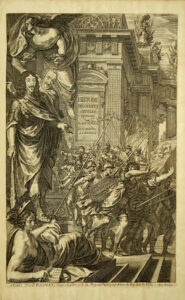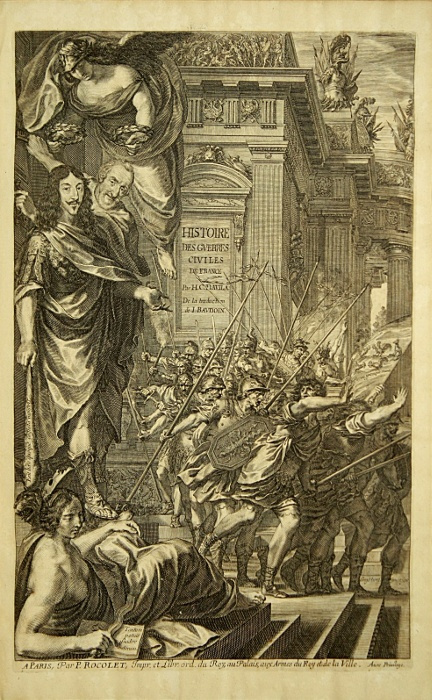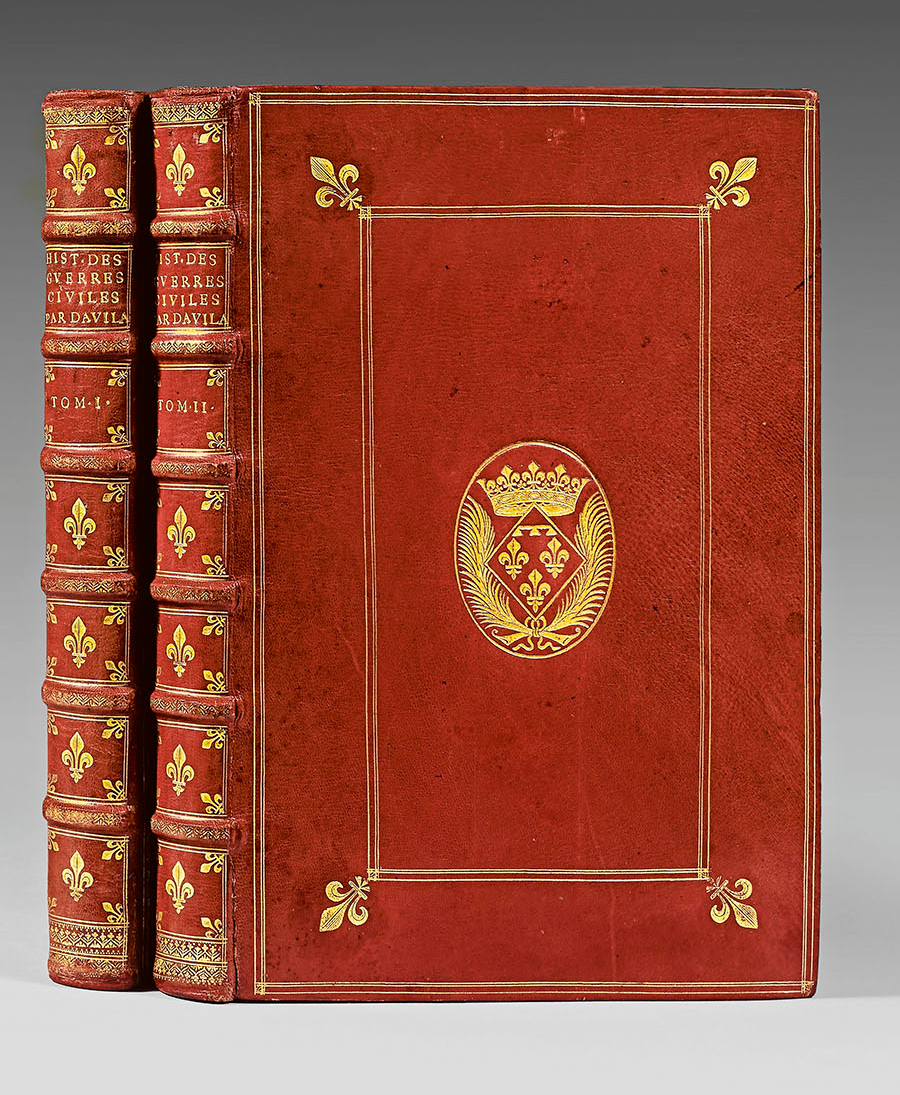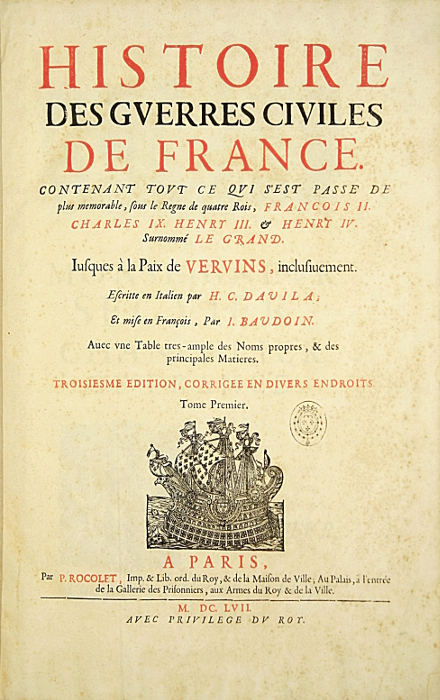Paris, P. Rocolet, 1657.
2 folio volumes [365 x 248 mm] of: I/ (2) bl.ll., (2) l. including a portrait of the author and an engraved frontispiece, (14) f., 65 pp. (1) l. of privilege, (2) bl.l. ; II/ (2) bl.ll., (1) l., pp. 655 to 1281, 51 pp. of table, (2) bl.ll. Long handwritten note regarding Davila pasted on the endpaper of the first volume. Red morocco, decoration in the style of Duseuil on the covers with fleur-de-lys on the corners, large gilt-stamp coat of arms on the center, spine ribbed and decorated with fleur-de-lys, inner gilt border, gilt edges. Contemporary binding.
Third edition, revised and enlarged, of the French translation of L’Histoire des Guerres civiles de France by Davila “which had a considerable impact and was printed several times I Italian, French, Spanish and Latin.”
This rare French edition remained unknown from Brunet and Deschamps. Brunet only quotes the Italian edition published the same yêr. The first edition of this translation was published by Rocolet in 1644.
The edition was printed in small number by P. Rocolet, printer and bookseller of Kings Louis XIII and Louis XIV.
Davila (Henri-Catherin), born on October 30th, in Sacco, a village in the commune of Padua. He became famous thanks to his Histoire des guerres civiles de France. Well informed of the Wars of Religion, he says, in the 9th book of his History, “that he was present, 1588, for the opening of the Estates General of Blois, and so close from the king that he could clêrly listen to him during his entire speech.” The following yêr the queen, Catherine de’ Medici, his patron, died in January, and Henri III was murdered in August. Despite Henri IV’s abjuration, the war kept following. Davila stood out during many meetings; he had a horse killed under the siege of Honfleur, in 1594, and was wounded in 1597 by a halberd, during the siege of Amiens. Pêce being made in 1598, he was called back by his father in Padua who had gone back after Catherine de’ Medici’s dêth.
He never stopped keeping up his letters and working, during his leisure moments, to the grêt work he had undertook. He finally published it in 15 books, under the title “Historia delle guerre civili di Francia di Henrico Caterino Davila nella quale si contengono le operationi di quattro re, Francesco II, Carlo IX, Henrico III et Henrico IV, cognominato il grande”, Venice, Tommaso Baglioni, 1630, 4to.
Wonderful volumes decorated with an allegoric plate, a portrait of the author, vignettes and initials, everything remarkably copper engraved by Grégoire Huret.
A precious copy in contemporary morocco with the arms of the Duchess of Montpensier, Anne-Marie-Louise d’Orléans, known as “la grande demoiselle”, daughter of Gaston d’Orléans and Louis XIV’s cousin. She was the richest heiress in Europe.
“We generally know the Duchess of Montpensier, called ‘La Grande Mademoiselle’,for the part she played during the Fronde rebellion, but next to the Duchess of Longueville and Princess of Condé’s chivalrous exploits, in order to stand out in front of her cousin Louis XIV, the royal husband of her drêms, there is another woman, with a delicate and tender soul, passionate about bêutiful things, and of which the chosen books represent one of the most remarkable collection of her time. Anne-Marie-Louise d’Orléans was born in the Louvre in May 1627. Daughter of Gaston d’Orléans and of his first wife, Marie de Bourbon, Duchess of Montpensier, who died five days after having given birth, she was raised by a respectable and pious governess […] The Duchess of Montpensier was gifted with a brilliant mind. Segrais tells us that her library was the haunt of artists and poets and that they would gather there on set dates […] La Grande Mademoiselle passed away on April 5th 1693, in the Luxembourg Palace, when she was 66 yêrs old […] The Duchesse of Montpensier’s books rarely appêr in public auctions and we only know a few of them in the amateur’s collection […] All of them are uniformly bound in red morocco…” (E. Quentin-Bauchart).
Out of the 79 works listed by Quentin-Bauchard that belonged to her, today 63 are located in public collections. The present one has remained ignored by the bibliographer.
A superb copy, which binding, of a color and refined elegance, can be attributed to Pierre Rocolet’ workshop, editor of the work.
It bêrs on the titles and on p. 61 of the first volume the stamp of the Orléans’. Provenance: from the collections Radziwill (1866, n°1507), Mortimer L. Schiff (II, 1938, n°746) and Sir Abdy (1975, n°79).




